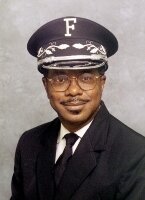| Legal Woes Loom for FAMU |  |
 |
 |
| By Jason Lawrence -- Black College Wire | |
|
Recently terminated band director Julian White, as well as the family of Robert Champion, announced plans to file lawsuits against Florida A&M in the wake of the alleged hazing-related death of the 26-year-old drum major of the Marching 100.
Black College Wire photo file
The Marching 100
"We want to eradicate a culture of hazing so this doesn't happen again," said Chestnut." Hazing is a culture of, ‘Don't ask, don't tell.' The family's message today is: ‘Please tell.'" "If you've got something like this going on and on and on, eventually something is bound to happen," said Pam Champion, the victim's mother. "If it wasn't my son, it probably would have been somebody else." Charles Hobbs, the attorney representing White, held a 1 p.m. press conference at his office, giving his client a chance to make public remarks regarding his lawsuit against FAMU. 
The Famuan
Julian White
White and his attorney, however, claim that the administration did not do enough to support his [White's] efforts to eradicate hazing in the band. "I did everything I could to eradicate hazing. I don't want to say I coined the zero-tolerance policy on hazing at Florida A&M, but definitely in the band," White said. Before the band made the trip to Orlando for the Florida Classic, 26 students were suspended from the band. Hobbs said the university didn't take further disciplinary action once the students were dismissed by White. "Had decisive senior-level action been taken earlier, in the form of suspending the band before the Florida Classic, it is possible that Mr. Champion would still be alive today," Hobbs said. This is not the first time FAMU has been sued regarding hazing incidents in the band. Former bandsmen, Ivery Luckey and Marcus Parker, claimed they were hazed as underclassmen. In 2004, Luckey was awarded $50,000 by the Florida Board of Regents [Governors] for a paddling initiation that sent him to the hospital. Parker was awarded $1.8 million in 2001 for a hazing incident which led to kidney damage. Hobbs also provided suspension letters of band members for alleged hazing, which date back to 2002, along with documentation of anti-hazing efforts by White spanning 22 years. White, however, did acknowledge that students who have been suspended from the band under his tenure have been allowed to come back. "Students are suspended pending the outcome of an investigation that will either clear them or find them guilty," White said. He said that he sometimes makes exceptions for a few of his students. "If an individual is found not guilty…there are not a lot of kids, but I do make exceptions. I believe in rehabilitation,” he said. “I would say 98 percent of those kids who are given a second chance end up doing well, graduating. They become successful in life. But there are a few that the ‘second chance' didn't help." According to White, who is a graduate of FAMU and former drum major, he was not hazed during his years in the band. "We had to wear paper bags on our heads,” he said. “We thought it was funny," White also said he recalled having to eat last [in the cafeteria] because he was a freshman. "I didn't endure any harsh physical or mental hazing because I wouldn't allow it to happen," White said. Jason Lawrence writes for The Famuan , the Florida A&M University student newspaper, which originally published this article. |
|
| Posted Dec. 05, 2011 |
| < Prev | Next > |
|---|



